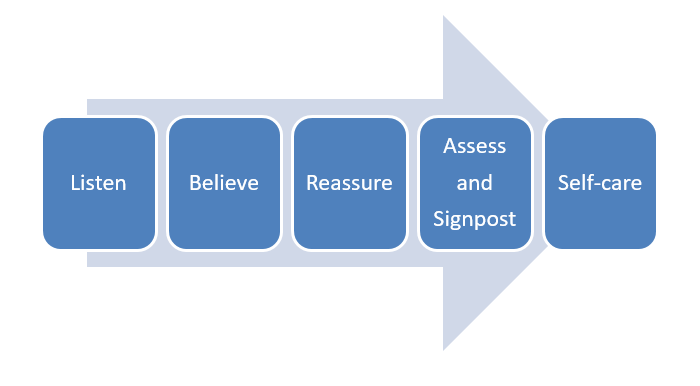How to support a student disclosing an incident
It is likely to be very difficult for a victim to speak about rape and sexual assault. It may have taken the person weeks or months or even years to be able to talk to anyone. Rape and sexual assault are extremely traumatic events. If a person is speaking to you then it indicates that they trust and esteem you. It is also possible that a student is speaking to you because events are affecting their academic performance in your module or course and that they therefore feel they must talk to you.
You should not assume that the victim has told anyone else. Whatever the reason for the victim coming to you may be, it is crucial that your response is appropriate.
Victims are often terrified of people knowing about what has happened to them and will ask you not to tell anyone else. As a member of staff, you cannot promise the student complete confidentiality because there are some situations where confidentiality cannot be maintained. You should realise that once a disclosure has been made to you the University is deemed to be put on notice that the allegation has been made.

Listen
Be patient and listen to the person and let them talk in their own time. Try to control any expression of shock or panic or disbelief. Do not ask for too many details about what has occurred. Do not ask for specifics of the rape or sexual assault. Remember that for many people, using the language of sex and body parts is extremely uncomfortable and that this discomfort will likely be even worse when talking to staff who are their senior and who they know professionally.
Believe
It is absolutely crucial that you accept what is being told to you and that you do not question it nor ask any questions which may signal doubt or disbelief. For example if you say, ‘I just can’t believe it!’ this may be interpreted as ‘I don’t believe you’. Do not ask questions about the victim’s actions which signify fault on the victim’s part, such as ‘were you drunk?’ or ‘what were you wearing?’ or ‘why didn’t you scream?’ or ‘why did you let x in your bedroom?’ or ‘why didn’t you ring the police?’ or ‘why didn’t you report it at the time?’ Do not ask any ‘why didn’t you do (x)’questions and do not suggest what the victim should or ought to have done. Do not question the victim’s account. Do constantly reassure the student that you believe them, that it’s not their fault, and that you are sorry that this has happened to them.
Reassure
Respond to the student in a caring manner, expressing empathy. Ask if you can call anyone for them and what they need right at this moment. Reassure the student that you will help them access the support they need, and that you are not judging them. Reassure them that there is no ‘right’ response to rape and sexual assault and that whatever they are feeling emotionally is perfectly normal. Different people react in different ways and want different outcomes. Whilst it is your job to be supportive of the student in this moment, it is not appropriate to indicate that you will be ongoing support for the student, as this may not be in the best interests of either party. You should reassure that student that there is professional and confidential support available with experts who have experience of those in their individual situation.
Assess and signpost
You are likely to have gained enough information to make a preliminary assessment of the situation. The student may just want to talk about it and be reassured that it is not their fault, or they may want to explain why they have been missing classes. What happens next depends on the type of disclosure. Assessing the situation and making a decision does not fall entirely on your shoulders, there is support in assessing the situation and the student wellbeing team should be your first port of call. You do not need to disclose names of students involved to the Champion. You can also call Devon Rape Crisis for specialist help and refer the student to the wellbeing webpages for continued support.
Self-care
You may be distressed about what you have heard after a disclosure has been made. The University can support you through contacting Spectrum Life.
